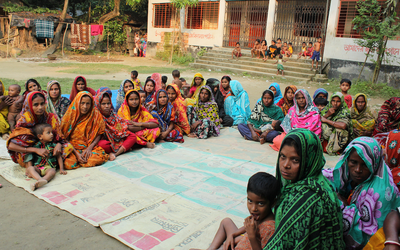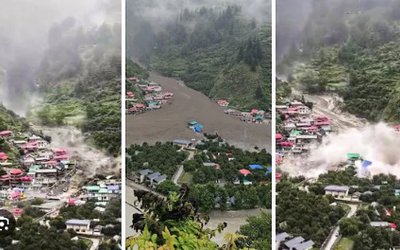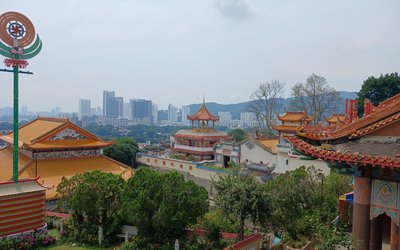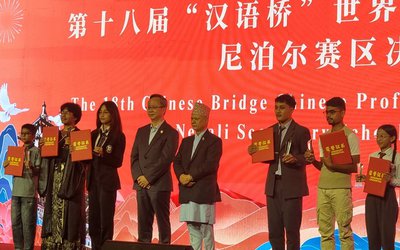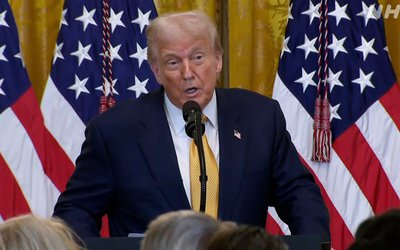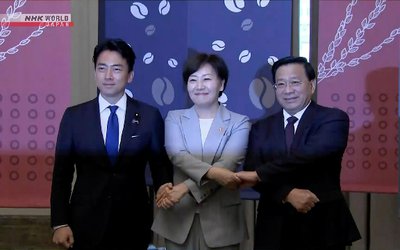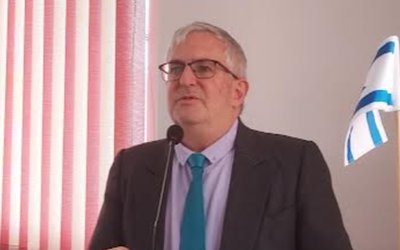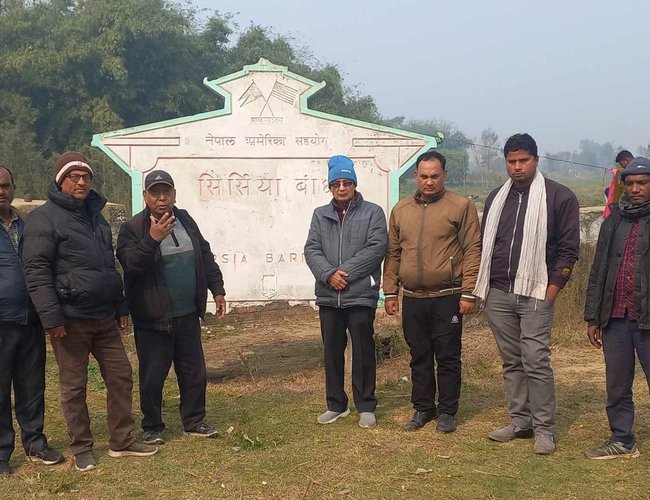
My multi-dimensional access to and experience of Dr.Prachanda Pradhan, 85, anchor on 53 years of contemporary time. He was born on 10th March,1939 in GuchchaTole located on the south-western side of Bir Hospital, Kathmandu. The multi-dimensional relations sketch I have drawn of him may look like the following.
My Teacher. He, as a lecturer, was engaged from1961to1970 at Trichandra College, Ghanta Ghar, Kathmandu forunder taking teaching courses in political science to intermediate and bachelor-level students. At the end of 60’s he was a senior research officer at the Centre for Economic Development and Administration (CEDA) of Tribhuvan University, Nepal. In that capacity, he interfaced teaching with research activities related to the public administrative affairs and policy issues in the country.
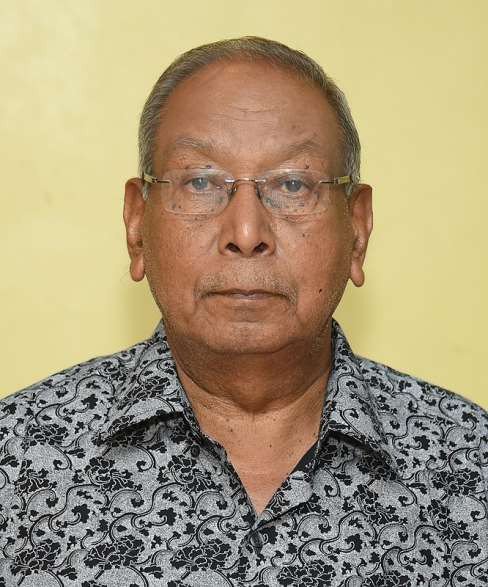
He was a confident teacher; blunt and with no liking of any appeasement in student-teacher, peerto peer and pedagogy-administration relations within college campus. Once he came down heavily on me for my inclination towards a passion of creativity (which for me meant to look at the academic question in hand a bit differently) anda preference for brevity in responding/answering to assessment/examination tasks. Calling me into his campus room, he said, "Try to understand the system of teaching-learning and assessment/examination in our higher education. This system does not have a room for academic creativity nor does it like brevity in analysis. The system's typical examiner values more an answer book with added page-sheet that contains some standard text book narratives. If you go on the way you are, there will be no surprise that the system will turn riskier for you." I felt a sense of solemnity in his voice which was imbedded in a genuine concern of a teacher for students' successes.
My First Public Employer. From 1973 to 1975, Dr. Pradhan was the dean of the newly established Institute of Business, Commerce and Public Administration (IBCPA) of Tribhuvan University. The Institute was founded to modernize the teaching and learning of Business, Commerce and Public Administration disciplines under the objectives and programs of the government's new National Education System Plan (1971-76). The new Institute boasted to have 120 faculty members and about 2,000 students.
As a straight forward academic administrator he took care of and supervised 11university campuses located in different parts of the country under the Institute. He led, managed and assisted development of curriculum, conducted examinations, taught courses to students, and trained staff. If any faculty member, staff and students approached him with a transparent issue, Dr. Pradhan would happily give time to them and provided them guidance. From 1975 to 1984, he was the professor of public administration at the CEDA. After my graduation (MA in political science) from Tribhuvan University in1974-75, I started looking for a public job. In those days, there were some choices I could make in the job market. I was looking for a job that would provide me a) flexibility in working hours, b) it was more academic with a degree of freedom in the way one thinks and acts, and c) it was based in Kathmandu with minimum chance of transfer outside Kathmandu. To meet my requirements, I prioritized the on-going one year and half post-graduate diploma in public administration (DPA) program being run at Shankar Dev Campus, PutaliSadak. The Campus was under the Institute of which Dr. Pradhan was the dean. In the beginning the DPA was started as a program of the CEDA with which he was associated. A visiting Filipino professor Avubewa(I hope I spelt the name correctly), I was told, was instrumental in designing and developing the first interdisciplinary curriculum in a university of Nepal. A sense of the interdisciplinary academic calibre of the program could be gained from a) the minimum bachelor level academic eligibility required for admission to the program, b) the program's accessibility to all arts, science, management and business graduate students, and c) rich packages of elective courses, like industrial, social psychologies and institution building for rural development in the curriculum. As the program was originally designed for the CEDA which was also entrusted to undertake short training courses to further develop senior executive staff in the arts, science and management of public administration affairs, I took the program as an interdisciplinary professional as well as academic opportunity and challenge. My inclination drove me more towards the program.
With a job in mind in this Shankar Dev Campus program, I visited the office of the dean, IBCPA located in Central Kirtipur Campus. The first staff I faced there was BishwaNath Tiwari from Dilli Bazar, Kathmandu, from my neighbourhood locality. We were unable to understand each other instantly. I felt Tiwari had some difficulty in oral communication. After some efforts, he could understand the purpose of my visit. He guided me into the office of Dr. Pradhan. I was amazed as Dr. Pradhan could easily understand Tiwari and the latter even allowed him to receive his phone calls. I explained my purpose of visit to Dr. Pradhan. He was cool. He said, there was some initial procedure to complete. He instructed Tiwari to tell me about the procedure; and we separated. It was a smart meeting indeed. As advised by Tiwari, I formally applied to the dean office for the specifiedjob. Tiwari specifically instructed me to pin one Rupee note with the application letter. I did accordingly. I joined the DPA program at Shankar Dev Campus as a temporary assistant lecturer right after the coronation of King Birendra in February, 1975.
In early 1976, Tribhuvan University authority conceived a separate campus for the public administration education program. We (Mahendra Narayan Mishra, MadhuNidhi Tiwari, UpendraGautam, the full time teaching faculty of the program at Shankar Dev Campus), were instructed to prepare a concept paper for the establishment of the Campus. We jointly prepared the paper with the rationale, its institution building, forward and backward linkages, and the academic and professional requirements to meet the contemporary needs of highly applied public administration education in Nepal, and for better harmonization of the program with the regular academic and administrative structure of the parent university. Clearly, the discipline of public administration education was getting transformed from the CEDA's distinct executive development training mode to the internationally recognized standards of interdisciplinary public administration education. On 31 July 1976 A.D., that is, 16 Srawan, 2033 B.S., Tribhuvan University formally made a decision to establish a "Separate Campus for Public Administration” (The Rising Nepal, 1 August 1976, p.1). It took another three years to have a full-fledged constituent campus of public administration in Tribhuvan University. Until 1979, Public Administration Campus continued offering Diploma in Public Administration (DPA) Program.
After getting formally separated from professorship in the Tribuvan University in 1980, Dr. Pradhan continued supporting the Public Administration Campus. He donated books and documents to the Campus library. Once I found the books required shelves for maintenance and neat use. I made a humble contribution to the Campus to meet the requirement. In a work stage I found myself moonlighting on my Campus duties. I did not like this. I resigned from Tribhuvan University as reader, which after years was duly approved in 2003-2004. In subsequent years, as a senior peer group member, Dr. Pradhan could ably manage time to get engaged with MPhil program that was started at the Campus in 2011 (2068 B.S.).
Mutual Learner and Knowledge Sharer. Whether one was a farmer, a peer group member, researcher, a junior colleague or a student, Dr. Pradhan would like to engage her/him in conversation with inquisitiveness. The flow of conversation would cover a certain period of a timeline in a community development dynamic. In the dynamic, one of his preferred themes of conversation seemed to be the institutional as well as socio-economic changes and emerging risks and challenges to the irrigated agriculture. The passion of sharing accumulated understanding and knowledge was another appeal in Dr. Pradhan's armory. Given the strong inter-disciplinary links of public administration and irrigated agriculture with different areas of knowledge and technology, once along with my elder brother late DevendraGautam, I had visited Dr. Pradhan at his residence in Thamel in mid-year of 1970s. At that time, we were associated with the publication of Rasayan, a quarterly magazine of science-literature. He, among others, shared with us several issues of a British journal "The Ecology." The journal was about impact of ecology on development and evolution of human civilization. We were impressed by the organic link between the society and nature. We translated a few articles from this journal for our magazine. These articles had unconventional wisdom given the Nepali society and sense of literature it had in those days.
Combined contribution of Dr. Pradhan as a teacher, as a learner and as a knowledge sharer was much intensively observed in his visiting faculty role, especially in the context of his university-ties in the USA. He was rarely tired of having exchanges on his substantively empirical process-based findings, conclusion and way forward on Nepal's Farmer-managed Irrigation Systems (FMIS) with almost all the university components. He never missed to underline FMIS's contribution to the country's food security and autonomous management of the local irrigated agricultural system. The latest international FMIS seminar May, 2023, for example, continued showing his university-tie when Lizzie Taber, a Cornell University student, presented a field work design paper on a study on "Transformative factors in community Irrigation in Nepal".
Consulting Colleague. We met as working colleagues in a USAID-funded Irrigation Management Project (IMP). We were together from the start up workshop of the project (1986) to its redesign (1990). He was Social Scientist for Cornell University, USA and I was a Water User Association Specialist for the East Consult/Louis Burger Inc. The project was a first full-scale pilot participatory development intervention in selected public irrigation systems located in Lamjung and Bara districts. The project was designed to build on the decreasing effectiveness and efficiency of the irrigation system's service delivery and low production character of the irrigated agriculture. The approaches used in the selected pilot systems were: a) farmers and their water user organization were the most integrated unit to assure the effectiveness, efficiency and equitability of the public irrigation systems, b) investment in essential structural improvements in the system worked as initial incentive to build on the evolving generational efficacy of the farmers, and c) internalization of best domestic and international practices assured local irrigated agricultural viability in competitive economic conditions.
Partner-in-Conservation and Promotion of Community Irrigation Heritage. Consolidated Management Services Nepal (Pvt.) Ltd (CMS), where I have been a founding member, conceptualized the FarmerManaged Irrigation Promotion (FMIS) Trust (Kisan-ByabasthitSichaiPrabardhanGuthi in Nepali) as a nonpartisan, non-profit, voluntary professional organization dedicated to the wellbeing of FMIS. Viewing FMIS as a natural-cultural heritage, the conservation and promotion work was to be carried out through activities pertaining to FMIS inventory, seminar, dialogue, research, student enrichment scholarship, icon of honor award (to accomplished national and international researchers/scholars/practitioners), training, recognition to and dissemination of best practicing FMIS to further promote them in changing socio-economic and environmental contexts. The establishment of the Trust was our tribute to the celebrated cultural, social and economic community (Guthi) values of FMIS heritage Nepal eternally takes pride in.
Since long, besides public irrigation systems, FMIS have been an academic research and a professional work area for our research and livelihood. The duly incorporated Trust at the office of the Chief District Officer of Kathamndu on 7th June 1998 (24 Jestha 2055 B.S.) was our humble expression of gratitude to the farmers of the country who on their own provided substantial food security to the country. To honor the best performing irrigation systems out of the inventory of the FMIST, FMIST had tried to start a tradition of identifying such systems and honoring them in the international seminar on FMIS that the FMIST organized periodically.
I was the founding chairman of the Trust and Founding members were: RajanSubedi, Krishna MurariGautam, Amrit Bahadur Karki, Lava Raj Bhattarai, Abinash Pant, Ajay Lall Shrestha, Prachanda Pradhan, Binayak Bhadra, Surya NathUpadhyay, Hari Upreti, Deb Raj Basnet, Trilok Man Sing Pradhan, and SachinUpadhyay
In the very beginning, seed money (totaling about hundred thousand Nepali rupees) was contributed to the Trust by UpendraGautam, RajanSubedi, Lava Raj Bhattarai, Krishna MurariGautam, Amrit Bahadur Karki, Abinash Pant, Ajay Lall Shrestha, Prachanda Pradhan and Surya NathUpadhyay
Dr. Pradhan enthusiastically used his interactive links with Prof. ElinorOstrom (popularly known as Lin Ostrom), the leading research figure in community of commons. Lin foresaw high stake in protecting them from tragedy. She ultimately showed to the world that we can best work to protect our commons' interests when factors like a clear definition of what we hold in common and who has access to it are specified. Such definition qualifies and ensures those using the resources are all able to participate in the common's decisionmaking processes. Her theory of commons was local communities are the best at managing natural resources as they are the ones that use them locally regulating their use.
Her confidence in the commons' indigenous self-governance did, to a substantive extent, emanate from the sustainable operation and management of FMIS in Nepal. She undertook a long insightful journey (1990- 2010) into Nepal's all-terrain FMIS. "Nothing prevents her to visit the irrigation systems and interact with farmers. She is really a field worker and believes that we can learn a lot from the farmers and villagers,” once Dr. Pradhan had said.
Lin Ostrom indeed was also the first overseas investor to personally contribute to the FMIST seed money fund in 1998. She inspired and encouraged FMIST by giving it the honor of recognizing her as “the Icon of the FMIST” in 2002.
In her key-note speech delivered at the Second FMIST international seminar, she said, "When donors speak to me about increasing the democratic process in Nepal and other countries, I immediately think of enhancing the capability of FMIS and forest-user groups. Some outside interventions have, however, endangered these democratic institutions by ignoring them or presuming they did not exist. Where they have survived, however, they are a solid foundation on which to build broader-based democratic institutions (so long as we do not confuse party dominance of an electoral process with a democratic process). True democratic processes allow individuals from all walks of life to perceive and articulate the problems that are most important to them and find ways of overcoming them. The farmers of Nepal have for many centuries found ways of solving some of their problems relatively well by associating, sharing knowledge, getting technical information where relevant, and monitoring government to be sure that it is honest, fair, and efficient.FMIS, and the FMIS Trust in particular, will play a major role in the democratic process in Nepal well into the future.”
The FMIST community was extremely elated when in 2009 Lin won Nobel Prize in Economic sciences. We shared her sense of glory as we learned that her research and understanding of Nepal FMIS played an outstanding role in her analysis of economic governance, "especially of the commons.” The Nobel Prize website as quoted in https://ostromworkshop.indiana.edu/about/ostroms-history/nobel-prize/index.htmla, among other, mentions, "Political scientist ElinorOstrom’s research methods differed from how most economists work. Usually they start with a hypothesis, an assumption of reality, which is then put to the test. ElinorOstrom started with an actual reality instead. She gathered information through field studies and then analyzed this material. In her book ‘Governing the Commons’ 1990, she demonstrated how common property can be successfully managed by user associations and that economic analysis can shed light on most forms of social organization. Her research had great impact amongst political scientists and economists."
The FMIST received her very warmly when she visited Nepal in the first week of December 2010. Since its inception, the Trust's operation has been based on its Constitution under which election of the executive committee of the Trust is usually held after every three years. Since its founding, the Trust has been statutorily privileged to have Dr. Richard Reidinger, Dr. Robert Yoder, and Dr. Douglas J. Merrey as its international advisers.
On June 29 2005, we at the Trust decided to honor Dr. Prachanda Pradhan with the honorary patronship of the Trust for his principled life time contribution and service to the FMIS. His sustained commitment to the values of the FMIS has been duly documented in the several books he has written, edited, and co-authored. These books included: Public Administration in Nepal (1975), Patterns of Irrigation Organization in Nepal (1989), Increasing Agriculture Production in Nepal: Role of Low Cost Irrigation Development through Farmer Participation (1989); Irrigation Association for Participatory Management in Asia (1998), Planning Process of Community Development: Village Development Plan (2002); and Improving Irrigation in Asia: Sustainable Performance of an Innovative Intervention in Nepal (2011). Dr. Pradhan has co-edited with me several books on FMIS.
Public Goods Promoter. Dr. Pradhan has always stood for the FMIS. But unlike an NGO-type character, he has never used his star FMIS credentials for partisan advocacy of farmers and FMIS against a public order and authority. As a public administration man by training, he has been aware that an exclusively right-based partisan advocacy of FMIS would only create unnecessary antagonism generating wider gaps between the public authorities and the farmers harming the national and local irrigated agricultural security. He seems to have adopted an outlook of optimum resilience whereby both the FMIS and public authorities understand and appreciate each other's comparative advantage to deliver greater public goods to the society.
A Hard Nut. There are people in the society who perceive Dr. Pradhan as a hard nut to crack. For me a conversation with a near acquaintance of Dr. Pradhan at the Schiphol Airport, Amsterdam was a lesson in dialectic. We were returning after taking part in the 2nd World Water Forum organized in The Hague in March 2000. The forum theme was "From Vision to Action." During the diversified and rich conversation, the acquaintance put a question to me, "How all these years you have been taking, Dr.Pradhan ?" Listening to his question, I felt I had also come across such question in the days past. And my response was: "Other person also asks me similar question. The more I started to understand Dr. Pradhan, the better our relations have been. The solution has been a simple relational tool I have been using in our inter-personal communication. When Dr.Prachanda Pradhan would be roaring (a word used figuratively by some people when he stresses a point or an argument), I keep listening to him without disrupting. After some moments, he would ardently look for the responses and this would be the time I would briefly make my point. As I would try to make my point considering the next action step in the task that he would have already identified or explained, we would be bridging each other's gap, if any, to realize the targeted task rather more effectively than creating a further gap in between." With an element of surprise, the acquaintance looked at me. We exchanged smile and got separated for our flights.
Personally, I believe that no human being is perfect. No one reaches perfection. Admired are those who keep on making efforts to realize the relative perfection. Dr. Pradhan at times has been impressed by an apparent benign attitude which mostly is projected by powerful personnel associated with a domestic or international public agency. A team worked decision was always a safeguard on such impression-making personnel. Such approach would be encouraging to make a correct decision under such situation. But at times, we also found out that such worked out decision is not possible because of time pressure of a scheduled task. We had an example of such a mistaken result when the FMIS Trust team happened to make a decision about selecting a FMIS Trust icon awardee.
To end. People may have built-in worldly preference. In an afternoon, a gentleman lectured me on Dr. Pradhan. His dislike of Dr. Pradhan, I discerned, was rooted in the job assignment in which he had to interact with him. There are people who could not connect with Dr. Pradhan; and in the process I learned perfection is beautifully imperfect as Dr. Pradhan's progress is nothing more than transforming our perfection into imperfection that inspires us for further perfection.
This is the excerpts of the research article by Dr. Gautam,
Dr. Gautam takes interest in institution building affairs in the fields of development, education and neighborhood foreign relations across the realm of public, community, private and non-governmental organizations.
The author is much obliged to Mr. RajanSubedi, Founding Member, FMIS Promotion Trust Nepal; Dr. Krishna Paudel, Director, CMS Engineering Consult; Prof. Dr. Shree Krishna Shrestha, Central Department of Public Administration, Tribhuvan University, Nepal; Mr. Deepak R. Pandey, Executive Member, FMIS Promotion Trust and Mr. Naveen M. Joshi, Chairman, FMIS Promotion Trust and Mr. AjayaLall Shrestha, Senior Consulting Engineer, CMS Engineering Consult for the peer review of the draft of "Prachanda Pradhan in a Multi-dimensional Relation Sketch". I am very thankful to Dr. Mohan Lohani, former ambassador and professorof English Language and Literature for his meticulous review of final draft of my article.


